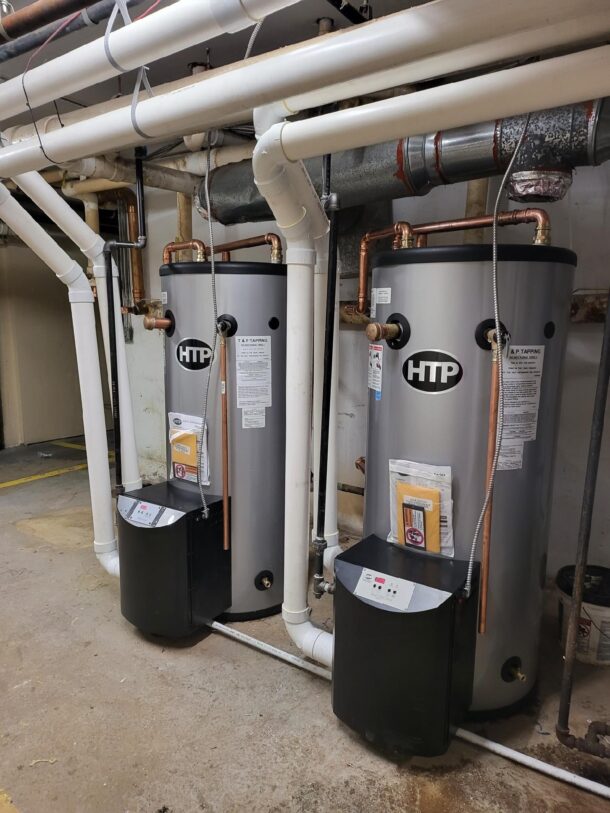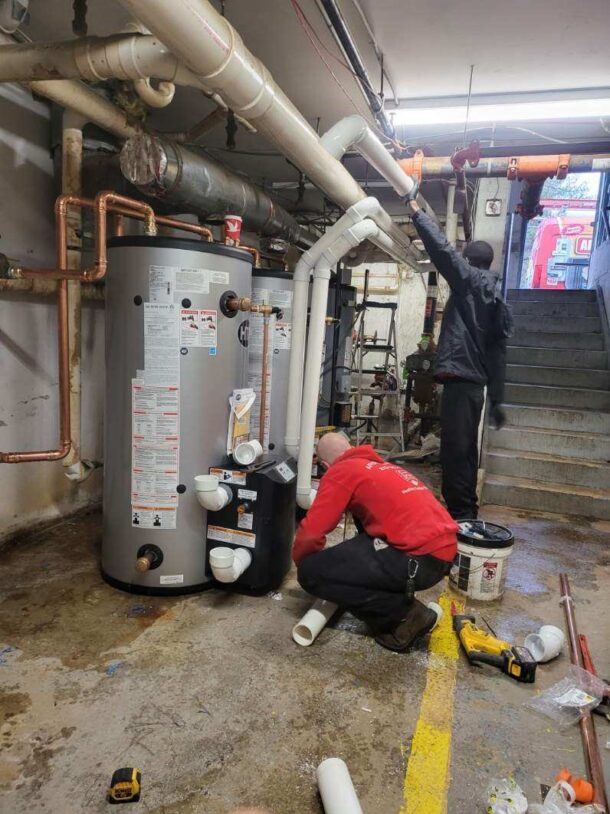Peak Season Plumbing Problem
During winter, not having hot water can be an aggravating experience for any homeowner. But if a hotel owner must deal with hot water interruption during the holiday season, the issue becomes much more disruptive and severe.
A hotel in the Philadelphia area with 88 rooms faced this problem just before Christmas when its water heating system failed. Normally, plumbing contractors are used to emergency service requests, but with a snowstorm on the way, an increased number of guests and the holidays arriving, this situation required particularly quick action.
The team at Affordable Fixes Heating Cooling Plumbing completed the task by installing two HTP Phoenix tanks, with each holding a capacity of 119 gallons and 199K BTU respectively. Tackling this task required the team to remove four faulty water heaters that were leaking and generating carbon monoxide in the building.
“There are always challenges but replacing four and putting in two meant we had to put in a new exhaust, re-pipe the system, and re-do the electric units,’’ said Val Savkin, owner of Affordable Fixes Heating Cooling Plumbing. “It was supposed to be a one-day job. It took three, which was very efficient given the scope of the project.”
Due to prior communication with the building owner, Savkin knew the condition of the system. When he received a call shortly preceding he holiday season, he knew his help would be needed.
“This was an emergency project,’’ Savkin said. “The water heaters that had been in place had deteriorated. They couldn’t be repaired any longer. It was just wear and tear, they were outdated. Just two days before Christmas we were out there in the snow getting the project finalized.”

Photos by Affordable Fixes Heating Cooling Plumbing
Before Savkin chose the HTP Phoenix units, he explored other possibilities. “These HTP units were new to us, but we wanted a high efficiency, fast recovery water heater. If we had used another system, we would have to put in at least 3 units,’’ Savkin said. “We saved the customer about $12,000 by selecting this system.”
To complete the in-depth project, Savkin deployed a team of four plumbers and a debris scrapper. The initial phase involved the deconstruction and removal of the current units.
The second step proved to be just as demanding as the first step. Electrical wiring, new exhaust and gas lines were all components required for the second phase, due to the new system requiring fewer heating units.
John Monaghan, a HTP National Training Manager assisted the project by evaluating the building’s heat requirements and proposed installing two Phoenix 119-gallon tanks. “That not only saved the building owner a lot of money, but it also allowed us make the installation a little bit quicker,” Monaghan said.
Placing the tanks in the hotel’s basement was no easy task throughout the setup process. “It was a very tight fit. We were fortunate to have an elevator handy,’’ Savkin said. “We had to disassemble the new units, put them in a box, put them in the elevator and then re-assemble them. If there had not been an elevator, we would’ve gone old school and roped them down.”

Workers from Affordable Fixes Heating Cooling Plumbing removed four water heaters and installed two HTP Phoenix 119 gallon tanks. Efficiency, durability and fast recovery factored into the decision to install the HTP products.
The selection of the HTP Phoenix water heaters was influenced by several reasons. The water heaters feature energy efficiency, durability and fast recovery that provides thermal comfort for hotel guests in a cost-effective way for the hotel owner.
“We didn’t know much about them, but we recently had training with them and I really liked their efficiency,’’ said Savkin, who has been in business in the Philadelphia area for more than three decades. “They were a great fit with a nice integrated control and easy to replace.”
Boasting a thermal efficiency rating of 96, the HTP Phoenix effectively uses 96 cents of every dollar towards heating purposes. On the other hand, a standard efficiency unit has a maximum capacity of a 60 percent efficiency rating, making the HTP Phoenix a significant upgrade. Operating at a 5:1 turndown ratio, the HTP Phoenix’s modulating burner delivers productive system efficiency even when the load is low.
To prevent corrosion, the HTP Phoenix comes with a 316L stainless steel tank. Furthermore, the unit includes a 7-year warranty for residential use and a 3-5-year warranty for commercial purposes.
“Most times you’ll get 8-12 years out of units, but like anything else it depends how much you take care of it,’’ Savkin said. “I could see these lasting 12-20 years. It’s all about the maintenance of the equipment, but it’s important to look at the water quality, too. The hardness and chemicals of the water has a lot to do with the longevity of the system.”
Receiving emergency service requests is typical for many plumbers, including Savkin. Having no access to heat or cold water will irritate any hospitality owner or homeowner, particularly during peak season.
“When we first looked at this project, we gave the owner a price and he didn’t get back to us right away,’’ Savkin said. “Then he called back and said he needed to have it done immediately. It’s an occupied hotel, and we are right around the corner. With the snow, the holidays and people traveling, this could have been a bad situation for him. We were glad to help him out and fix it quickly.”
Brian Giardina writes on a wide range of trade industry topics for publications throughout the United States.




Join the conversation: